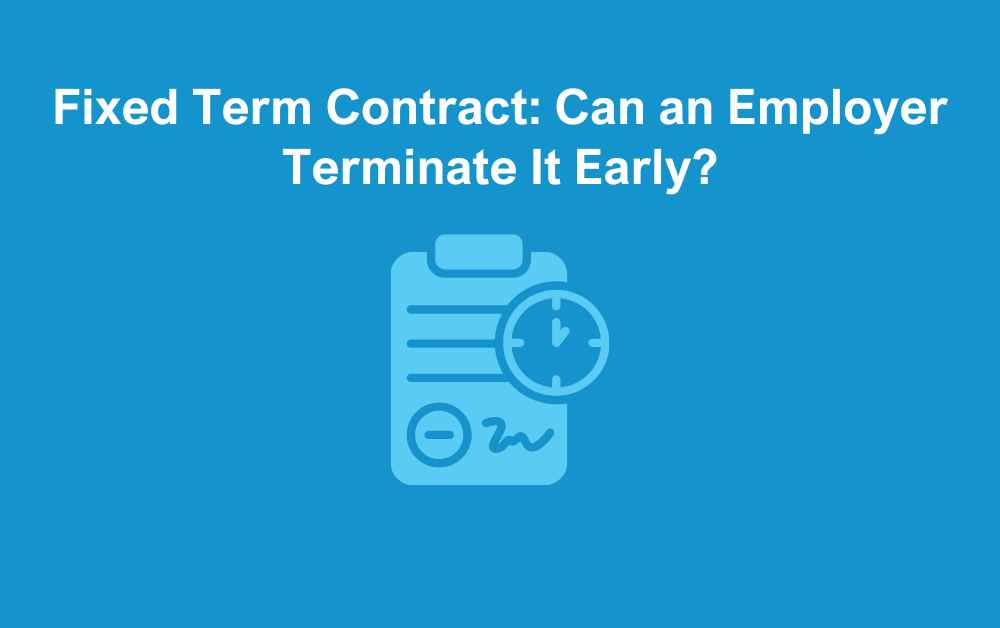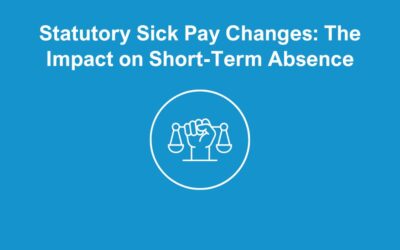A fixed term contract is a common solution for covering short-term needs, such as maternity leave, seasonal work, or specific projects. While these agreements are designed to run for a set period, questions often arise about what happens if circumstances change. Can an employer end this type of contract before its agreed expiry date? In this blog, we’ll explore the legal considerations, potential risks, and best practices around early termination of fixed terms in the UK.
Can an employer terminate a fixed term contract early?
You will be able to terminate an employees fixed term contract before the expiry date if it includes a clause allowing for early termination. Examples of this may be:
- The contract clearly states you can end the employment at any time by giving one week’s or one month’s notice.
- If maternity cover is no longer needed due to an early return, the employer must follow the notice clause to end the agreement.
However, if the contract doesn’t have a clause with specific provisions, terminating the contract early is a breach of contract. In this case, staff may claim compensation equal to the remainder of the fixed term.
What is a fixed term contract
An employee has a fixed term contract if:
- They hold an employment contract directly with the organisation they work for.
- The document is set to end on a specific date or when a particular task or project is completed.
Individuals are not considered fixed-term employees if:
- Their contract is with an agency instead of the organisation they are working for.
- they are on a work-experience placement as a trainee or student
- are employed under a contract of apprenticeship
- member of the armed forces
They might be considered a fixed-term employee if they are:
- a casual or seasonal worker employed for up to 6 months during a busy period.
- An employee who specialises in a specific skill that’s needed for a project
- maternity leave cover
Staying Compliant
Giving notice
Expanding on what we mentioned above, it’s crucial that you provide employees with an appropriate length of notice and state this clearly in the fixed term contract. If your employees agreement is for 10-months, you should include this in the contract along with the start and end date. If you fail to do this and continue to employ/pay the employee beyond this point, this will be seen as an ‘implied agreement’ by the employer that the end date of the contract has changed. You will then need to give notice if you want the employee to leave after the expiry date.
Employees with a fixed term contract have the right to a minimum notice of:
- 1 week if they have worked continuously for at least one month
- A week for each year they’ve worked. this is if they have worked continuously for 2 years or more
It’s encouraged to include a clause in the contract with instructions on what will happen in terms of a notice period if the contracts run over.
Limit on Renewing a Fixed Term Contract
An employee who has been on this type of contract for four years or more will automatically become a permanent employee, unless the employer can demonstrate a valid business reason to prevent this.
However, this automatic right can be removed if the employer and a recognised union or staff association have a collective agreement in place stating otherwise.
Unfair Dismissal and Redundancy
Under the Employment Rights Act 1996, the end of a fixed term contract is still classed as a dismissal. This means you must have a fair and lawful reason, even if the contract had a clear end date.
If the employee has been with you for over 12 months, they’re entitled to a written explanation if their contract is not renewed.
After two years of continuous service under one or more fixed-term contracts, employees gain protection against unfair dismissal. Acceptable reasons for dismissal include capability, conduct, legal restrictions, redundancy, or another substantial reason. If redundancy is the reason, the employee may also be entitled to a redundancy payment.
For those with over two years’ service, if you choose not to renew the contract, a fair dismissal process is required. This involves meeting with the employee, giving written reasons, and offering the right to appeal.
Employee Rights
Employers must treat employees on a fixed term contract the same as they treat permanent staff. This means that:
- they should get the same conditions and pay as full time staff
- the same or equivalent benefits package
- details of permanent job opportunities within the organisation
- protection against dismissal or redundancy
Although, they are only entitled to the same rights as permanent staff employed by the same employer, not by any associated organisation.
Summary: How The HR Booth Can Help
Managing a fixed term contract can be a balancing act — ensuring your business needs are met while staying compliant with employment law. From drafting robust contract clauses to handling early terminations fairly, it’s essential to follow the correct procedures to avoid costly disputes.
At The HR Booth, we support businesses across the UK with expert HR advice tailored to your situation. Whether you need help creating compliant fixed-term contracts, handling an early termination, or managing the transition from fixed-term to permanent employment, our team is here to guide you every step of the way.
We can also support with:
-
Drafting and reviewing employment contracts
-
Advising on notice periods and fair dismissal procedures
-
Managing redundancy and employee rights
-
Ensuring equal treatment of fixed-term and permanent staff
If you’re unsure about your responsibilities or want to make sure your processes are watertight, get in touch with The HR Booth today. We’re here to help you stay on the right side of employment law while keeping your team running smoothly.
Need support with a fixed term contract or any HR issue?
Call us on 01383 668178 or email advice@thehrbooth.co.uk. We are ready to help you with all your HR needs.







